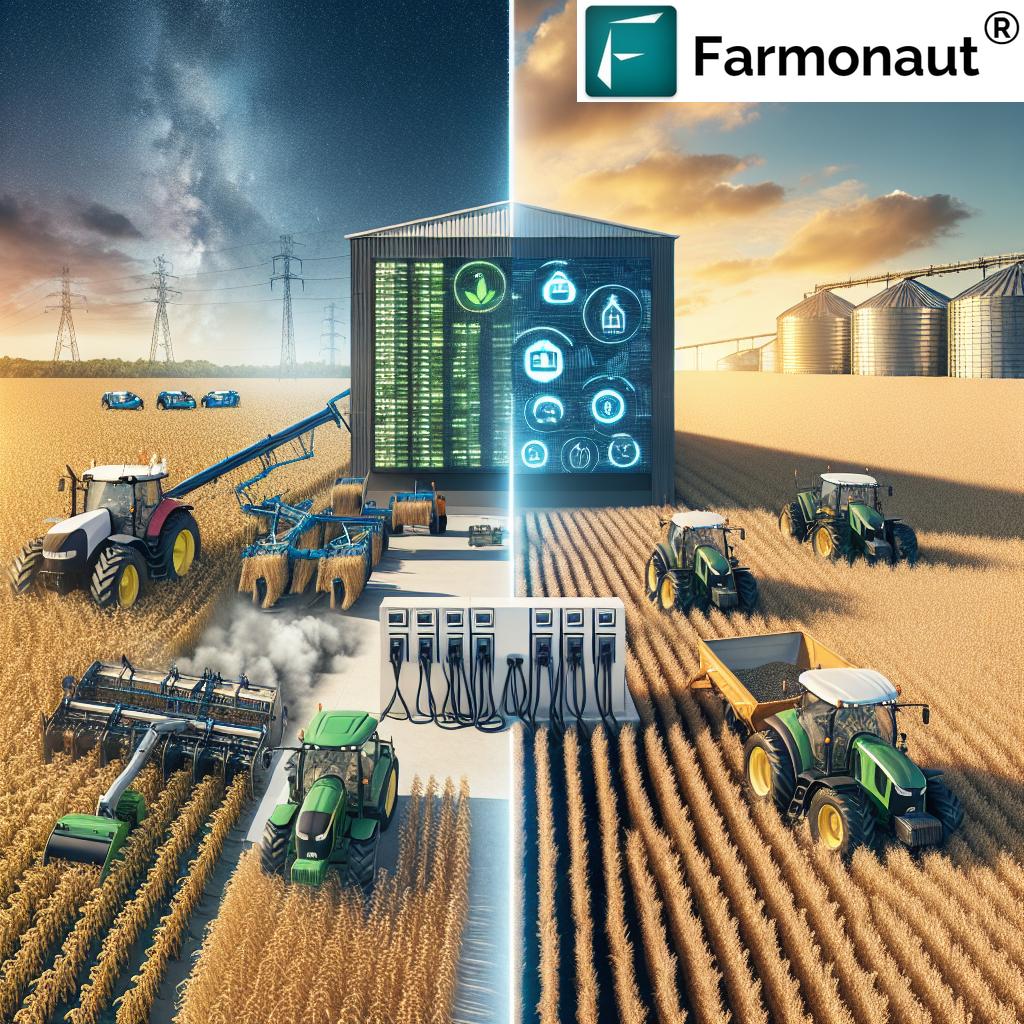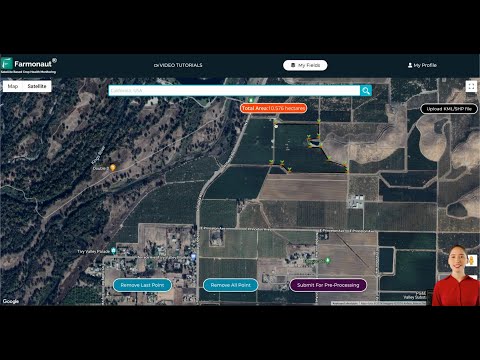The Future of Farming: Electric Machinery Revolutionizing Agriculture in Canada and the US by 2024
“By 2024, electric farm machinery is expected to significantly reduce agricultural emissions in Canada and the US.”
As we approach 2024, the agricultural landscape in Canada and the United States is undergoing a remarkable transformation. Electric farm machinery and battery-powered agricultural equipment are at the forefront of this revolution, promising to reshape the way we cultivate our lands and produce food. In this comprehensive guide, we’ll explore how these sustainable farming technologies are set to revolutionize the industry, focusing on the rapid advancements and adoption trends in both countries.
The Rise of Electric Farm Machinery
The shift towards electric farm machinery represents a significant leap in agricultural innovation. As we delve into this topic, it’s crucial to understand the driving forces behind this change and the potential impact on farmers, crops, and the environment.
- Reduced emissions and environmental impact
- Lower operational costs for farmers
- Improved efficiency and performance
- Government initiatives supporting clean technology in agriculture
At Farmonaut, we recognize the importance of staying ahead in this rapidly evolving landscape. While we specialize in satellite-based farm management solutions, we’re excited to see how electric machinery complements precision agriculture technologies like ours.

Electric Compact Track Loaders: Leading the Charge
One of the most promising developments in electric farm machinery is the emergence of electric compact track loaders. These versatile machines are proving to be game-changers in various agricultural operations.
Key advantages of electric compact track loaders include:
- Zero emissions during operation
- Reduced noise pollution
- Lower maintenance requirements
- Improved maneuverability in tight spaces
Farmers across Canada and the US are increasingly adopting these machines for tasks such as material handling, landscaping, and light construction work on farms.
Electric Utility Vehicles: Transforming On-Farm Transportation
Electric utility vehicles (UTVs) are another category of equipment making waves in the agricultural sector. These versatile vehicles are ideal for various farm tasks, from transporting supplies to conducting field inspections.
Benefits of electric UTVs in agriculture:
- Enhanced energy efficiency
- Lower fuel costs
- Reduced carbon footprint
- Quiet operation, minimizing disturbance to livestock
As battery technology continues to improve, we expect to see a significant increase in the adoption of electric UTVs on farms across North America by 2024.
Clean Technology in Agriculture: A Paradigm Shift
The integration of clean technology in agriculture goes beyond just electric machinery. It encompasses a wide range of innovations aimed at making farming more sustainable and efficient.
“Electric compact track loaders and utility vehicles are leading the zero-emission equipment revolution in farming by 2024.”
Key areas of clean technology in agriculture include:
- Precision agriculture tools (like those offered by Farmonaut)
- Renewable energy systems for farm operations
- Smart irrigation technologies
- Sustainable pest management solutions
While Farmonaut focuses on satellite-based solutions, the synergy between our technology and electric farm machinery is evident. Both aim to optimize resource use and reduce environmental impact.

Electric Vehicle Adoption Trends in Farming
The adoption of electric vehicles in farming is gaining momentum, driven by a combination of technological advancements, economic incentives, and environmental concerns.
Factors influencing EV adoption in agriculture:
- Decreasing battery costs
- Improved charging infrastructure
- Government subsidies and tax incentives
- Growing awareness of climate change impacts
In Canada and the US, we’re seeing a steady increase in the number of farms incorporating electric vehicles into their operations. This trend is expected to accelerate as more manufacturers enter the market and offer a wider range of electric farm equipment options.
Government Initiatives Shaping the Future of Farming
Both the Canadian and US governments are playing crucial roles in promoting the adoption of electric farm machinery through various initiatives and policies.
Key government actions include:
- Financial incentives for purchasing electric farm equipment
- Research and development funding for agricultural EV technology
- Infrastructure investments to support EV charging on farms
- Regulatory frameworks promoting sustainable farming practices
These initiatives are crucial in accelerating the transition to electric farm machinery and supporting the broader goals of reducing agricultural emissions and promoting sustainable farming practices.
Advancements in Battery Production for Agricultural EVs
The rapid evolution of battery technology is a key driver in the adoption of electric farm machinery. Improvements in battery production are addressing many of the initial concerns farmers had about electric equipment.
Recent advancements include:
- Increased energy density for longer operating times
- Faster charging capabilities
- Enhanced durability for harsh farm environments
- Reduced production costs, making EVs more affordable
These developments are making electric farm machinery increasingly viable for a wide range of agricultural applications, from small family farms to large commercial operations.
Electric Drivetrain Technology for Agriculture
The development of electric drivetrain technology specifically designed for agricultural applications is another crucial factor in the adoption of electric farm machinery.
Key features of agricultural electric drivetrains:
- High torque output for demanding farm tasks
- Precise speed control for improved operational efficiency
- Regenerative braking to extend battery life
- Modular designs for easy maintenance and upgrades
These specialized drivetrains are enabling the development of a wide range of electric farm equipment, from tractors to harvesters, that can meet or exceed the performance of their diesel counterparts.
Impact on Various Crops: From Corn to Canola
The adoption of electric farm machinery is set to have a significant impact on the cultivation of various crops, including major commodities like corn, canola, and soybeans.
Benefits for specific crops:
- Corn: Precision planting and harvesting with electric equipment
- Canola: Reduced soil compaction due to lighter electric machinery
- Soybeans: Improved weed management with electric precision sprayers
- Cereals: Enhanced efficiency in seeding and harvesting operations
At Farmonaut, our satellite-based crop monitoring solutions complement these electric machinery advancements, providing farmers with comprehensive data to optimize their operations across various crops.
Global Perspectives: Beyond Canada and the US
While our focus has been on Canada and the US, it’s important to note that the electric farm machinery revolution is a global phenomenon.
International developments:
- Europe: Leading in electric tractor development
- Asia: Rapid adoption of small-scale electric farm equipment
- South America: Growing interest in electric machinery for large-scale farming
- Australia: Pioneering autonomous electric farm vehicles
These global trends are driving innovation and competition, ultimately benefiting farmers worldwide with more options and improved technology.
The Role of Weather and Climate in Electric Machinery Adoption
Weather and climate conditions play a crucial role in the adoption and performance of electric farm machinery. As climate patterns shift, the advantages of electric equipment become even more apparent.
Weather-related benefits of electric machinery:
- Reduced emissions help mitigate climate change impacts
- Better performance in extreme temperatures
- Improved reliability during unpredictable weather events
- Enhanced adaptability to changing farming seasons
Farmonaut’s weather forecasting capabilities, combined with our satellite-based crop monitoring, can help farmers make informed decisions about when and how to use their electric machinery for optimal results.
Economic Implications: From Future Prices to Cash Prices
The shift towards electric farm machinery is expected to have significant economic implications for the agricultural sector.
Economic considerations:
- Initial investment costs vs. long-term operational savings
- Impact on crop futures and cash prices
- Potential for new revenue streams (e.g., carbon credits)
- Changes in farm labor requirements and skill sets
As the adoption of electric machinery increases, we anticipate seeing shifts in agricultural economics that will reshape the industry’s financial landscape.
Electric Farm Machinery Adoption Forecast
| Year | Canada Adoption Rate (%) | US Adoption Rate (%) | Top Electric Farm Equipment Type | Estimated CO2 Emissions Reduction (tons) |
|---|---|---|---|---|
| 2024 | 5 | 7 | Compact Track Loaders | 100,000 |
| 2025 | 8 | 10 | Utility Vehicles | 150,000 |
| 2026 | 12 | 15 | Small Tractors | 225,000 |
| 2027 | 18 | 22 | Harvesters | 350,000 |
| 2028 | 25 | 30 | Large Tractors | 500,000 |
| 2029 | 35 | 40 | Sprayers | 700,000 |
| 2030 | 45 | 50 | Autonomous Vehicles | 1,000,000 |
The Future of Farming: A Sustainable Vision
As we look towards 2024 and beyond, the future of farming in Canada and the US is increasingly electric, sustainable, and technologically advanced. The adoption of electric farm machinery, combined with precision agriculture solutions like those offered by Farmonaut, is paving the way for a more efficient and environmentally friendly agricultural sector.
Key takeaways:
- Electric machinery is set to significantly reduce agricultural emissions
- Adoption rates are expected to accelerate rapidly from 2024 onwards
- Government support and technological advancements are driving the transition
- The integration of electric machinery with precision agriculture tools will revolutionize farming practices
As we embrace this electric revolution in agriculture, Farmonaut remains committed to providing cutting-edge satellite-based farm management solutions that complement these advancements. Together, we’re shaping a more sustainable and productive future for farming.
FAQ Section
Q: How do electric farm machines compare to traditional diesel-powered equipment in terms of performance?
A: Electric farm machines are increasingly matching or exceeding the performance of diesel-powered equipment. They offer high torque, precise control, and often have lower maintenance requirements.
Q: What is the average cost difference between electric and conventional farm machinery?
A: Initially, electric farm machinery may have a higher upfront cost. However, over time, the lower operational and maintenance costs often result in a lower total cost of ownership.
Q: How long can electric farm equipment operate on a single charge?
A: Operating times vary depending on the equipment and task. Many modern electric farm machines can operate for 6-8 hours on a single charge, with some advanced models offering even longer run times.
Q: Are there charging infrastructure challenges for farms adopting electric machinery?
A: While charging infrastructure is improving, it can still be a challenge for some farms. Many governments and utility companies are offering support and incentives to help farmers install charging stations.
Q: How does weather affect the performance of electric farm equipment?
A: Electric equipment generally performs well in various weather conditions. Cold temperatures can affect battery life, but many manufacturers are developing solutions to mitigate this issue.
For more information on how Farmonaut’s satellite-based solutions can complement your farm’s transition to electric machinery, visit our web app or download our mobile apps:
For developers interested in integrating our technology, check out our API and API Developer Docs.
Farmonaut Subscriptions
As we move towards a more electrified and sustainable agricultural future, Farmonaut remains committed to providing farmers with the tools they need to optimize their operations. Our satellite-based solutions complement the advancements in electric farm machinery, offering comprehensive insights for precision agriculture.
Stay ahead in this rapidly evolving agricultural landscape by leveraging Farmonaut’s technology alongside the latest in electric farm equipment. Together, we can create a more sustainable and productive future for farming in Canada, the US, and beyond.





